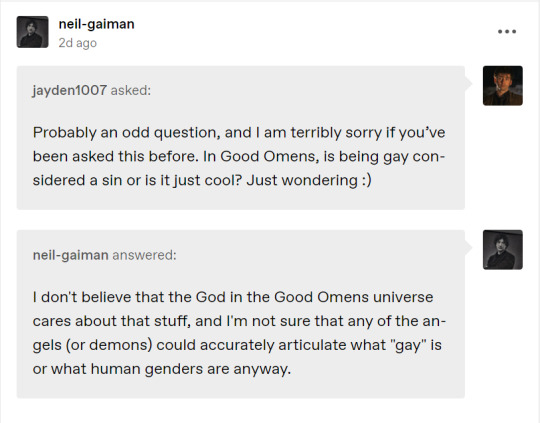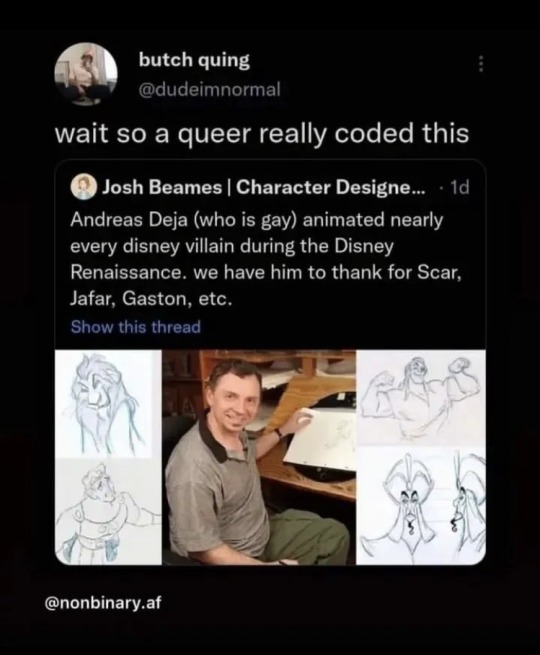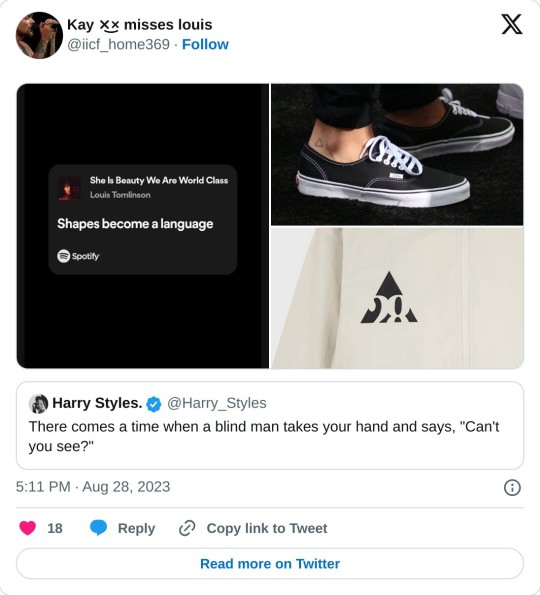#queer coding
Text
Hot take: the majority of queer coding relies on the assumption that platonic relationships cannot be as deep or caring as romantic ones. I recognize that queer coding is important to many people, but I think it can and should be done in a less amatonormative way. We as a society need to get better at facing the hard truth that many things that bring comfort, joy, and belonging also perpetuate truly harmful ideals.
#aro#ace#aromantic#asexual#aromanticism#asexuality#arospec#acespec#aspec#aroace#queer#lgbtqia#amatonormativity#queer coding#hot take#the menace is yapping
5K notes
·
View notes
Text
Queer subtext save me…queer subtext…save me queer subtext
#Merlin#bbc merlin#arthur pendragon#merthur#gwaine#she ra#Catradora#scorpia#glimmer#stranger things#byler#will byers#mike wheeler#el hopper#steve harrington#mulan#community#troybed#little women#jo march#josephine march#queer coding#gay coded#lesbian coded#bi coded#lgbt#lgbtq+
488 notes
·
View notes
Text
Graphic design is my passion and 80’s movies are my vice

#all my opinion ofc but some of it feels very intentional to me#please add more if you have any#happy pride month from me and my need to make it un-straight#the queer fashion spectrum is just the breakfast club tbh#80s movies#dead poets society#dps#stand by me#the outsiders#the lost boys#the breakfast club#top gun#heathers#ferris beuller#ferris bueller's day off#queer coding#1980s movies#lgbtqia#movie memes#hello lgbtq community#happy pride ig#I photoshopped this in Instagram :P#omg hit tweet! /j
14K notes
·
View notes
Text
As a multi-shipping bisexual person who has been crying tears of joy for the past two episodes over the bi-buck story arc - I need you all to know that the weirder you guys are about it (and let's be real right now, you guys are being INCREDIBLY weird about it), the more uncomfortable I, an actual real life queer person, get with Buddie.
I genuinely love Buddie, one of my all time favorite fics across any fandom is "My Fingerprints Smeared on Your Heart", but I'm very hesitant to believe it will ever happen. So when ABC brings in Tommy and starts a VERY WELL WRITTEN and BEAUTIFUL queer story that UPLIFTS MY HEART and then I go into fan spaces to see people trashing on BuckTommy, or screaming "no Buck thats the wrong guy", or wanting the relationship to end with Buck cheating (which is incredibly biphobic btw) with Eddie, or implying/hoping that Tommy is an abuser that Buck can be saved from by Eddie, or any of the countless other scenarios that turn Buck's happily-and-safely-exploring-his-sexuality arc into small-or-traumatic plot point for the purpose of making Buddie canon it makes me feel deeply uncomfortable with Buddie and my fellow 911 fans. And that makes me sad, because I love fan spaces and I love interacting with people who like the same things as me!
Also, please learn the difference between queerbaiting and queer coding.
#911 abc#bucktommy#buddie#evan buckley#eddie diaz#tommy kinard#bisexuality#fan culture#queerbaiting#queer coding
335 notes
·
View notes
Text

#trans#queer coding#amethyst#nimona#meme#don't know/remember the other two#nonbinary#steven universe#she ra#dragon ball#i guess#zarbon#double trouble#shapeshifter#zam wesell#star wars#gotta be one of my favorite genders
666 notes
·
View notes
Text
What is Coding?
Coding is the practice of adapting key characteristics of a real life demographic group within a fictional setting, such that while the source group is not named explicitly, the adaptation is intentional. This has been heavily used in satire and controlled forms of media to use subtext when explicit labeling was not possible or desired. Coding has also been used in worldbuilding for speculative fiction when the author finds it useful to incorporate references to real life groups in settings where they might not exist.
The difference between effective and ineffective coding comes down to if audiences easily recognize the group being coded. However, effective coding does not necessarily mean good coding. Good coding should resonate with the group that the coding is based on, not just the general audience. There are many historical examples of effective but bad coding. These tend to rely on stereotypes and cultural appropriation to villainize or satirize a group with a bastardized portrayal.
Further Reading:
See our #coding tag.
---
This Q&A is an excerpt from our General FAQ for Newcomers, which can be found in our new Masterpost of rules and FAQs. Check it out for more FAQs like this one!
-Writing With Color
#writing with color#writeblr#representation#coding#queer coding#writers on tumblr#writing advice#writing tips#faq
672 notes
·
View notes
Text
Heaven's Not Homophobic in Good Omens, and Why That's Important
I need to preface this with, I am not trying to start a fight or argument and won't tolerate any homophobic or bad faith arguments in response to this. Cool? Cool.
This is in large part inspired by this ask from Neil's blog, which sparked some discourse that I don't want to get involved in but that brought up some analytic questions for me.

He goes on to reblog a question asking about Uriel's taunt specifically, clarifying that "boyfriend in the dark glasses" can just as easily be read/translated from angelic as girlfriend or bosom buddy. The idea is that an angel and a demon "fraternizing" is seriously looked down upon, not that heaven is homophobic. And that's super important.
We see homophobia in both the book and show, of course. Aziraphale is very queer-coded, intentionally and explicitly so, and we see the reaction of other humans to that several times. Sergeant Shadwell, for example, and the kid in the book that calls him the f-slur when he's doing magic at Warlock's birthday party. These are, however, individual human reactions to his coding as a gay man.
I am, personally, not a fan of heaven redemption theories for the show; no hate for people who want that it's just not something I'm interested in. I don't believe that heaven is good with bad leadership, or that God Herself remains as a paragon of virtue. To me, that's not in line with the themes and messages of the show. It's important, however, that heaven doesn't reflect human vices. Heaven can be nasty and selfish and apathetic in its own right without ableism, homophobia, transphobia, or racism. This matters for two reasons.
Firstly, we don't need the -isms and -phobias to be evil or at least ethically impure. In a world where we spend so much time fighting against prejudice and bigotry, our impulse is to see that reflected in characters whose motivations we distrust or who we're intended to dislike. While it's true that that's often the big bad evil in our daily lives, it can really cheapen the malice in fictional evil from a storytelling standpoint. A villain motivated by racism or as an allegory for homophobia can be incredibly compelling, but not every bad guy can be the physical representation of an -ism. Art reflects the reality in which it's crafted, but the complexity of human nature and the evil it's capable of can't be simplified to a dni list.
Secondly, and I think more importantly, is that for Good Omens specifically, this places the responsibility for homophobia on humanity. If you're in this fandom, there's like a 98% chance you've been hurt by religion in some way. For a lot of us, that includes religious homophobia and hate, so it makes sense to want to project that onto the 'religious' structure of Good Omens. It's a story that is, in many ways, about religious trauma and abuse. However, if heaven itself held homophobic values, it would canonize in-universe the idea that heaven and religion itself are responsible for all humanity's -isms and -phobias and absolve humans of any responsibility. Much like Crowley emphasizes repeatedly that the wicked cruelty he takes responsibility for is entirely human-made, we have to accept that heaven can't take the blame for this. To make heaven, the religious authority, homophobic would simply justify religious bigotry from humans. By taking the blame for religious extremism and hatred away from heaven and the religious structure, Good Omens makes it clear that the nastiness of humanity is uniquely and specially human and forces the individual to take responsibility rather than the system. Hell isn't responsible for the Spanish Inquisition, which by the way was religiously motivated if you didn't know, and heaven isn't responsible for Ronald Reagan.
This idea is perhaps more strongly and explicitly expressed in the Good Omens novel, in the scene where Aziraphale briefly possesses a televangelist on live TV. It's comedic, yes, but also serves to demonstrate that human concepts of the apocalypse and religious fervor are deeply incorrect (in gomens universe canon) and condemn exploitation of faith practices. Pratchett and Gaiman weave a great deal of complexity into the way religion and religious values are portrayed in the book, especially in the emphasis on heaven and hell being essentially the same. They're interested in the concept of what it means to be uniquely and unabashedly human, the good and the bad, and part of that is forcing each individual person to bear the brunt of responsibility for their own actions rather than passing it off onto a greater religious authority.
Additionally, from a fan perspective, there's something refreshing about a very queer story where homophobia isn't the primary (or even a side) conflict. The primary narrative of Good Omens isn't that these two man-shaped-beings are gay, it's that they're an angel and a demon. The tension in their romantic arc arises entirely from the larger conflict of heaven and hell, and things like gender and sexuality don't really matter at all. Yes, homophobia and transphobia are very real, present issues in our everyday lives, but they don't have to be central to every story we tell. There's something really soothing about Crowley and Aziraphale being so queer-coded and so clearly enamored with each other without constantly being bombarded with homophobia and hate. It's incredible to see a disabled angel whose use of a mobility aid makes no difference in their role and to see angels and demons using they/them pronouns without being questioned or misgendered. It's all accepted and normalized, and that's the kind of representation that we as queer people deserve.
#anywho that got real long#good omens#neil gaiman#terry pratchett#media analysis#good omens analysis#queer coding#queer representation#ineffable husbands#gomens#aziraphale x crowley#anywho happy valentines day#love my fandom#not beta read or majorly edited because I'm a busy guy with homework so lmk if there's any errors that need correcting (politely!)
274 notes
·
View notes
Text

as an aro there are just some things that i hear other shippers say that make me want to bang my head into a wall
#aromantic#shipping#lgbtqia+#romantic#queer stuff#queer coding#queerbaiting#stop invalidating non-romantic relationships#friends don't look at each other like that#seriously shut the fuck up#friends can do whatever they want#rant#romantic isnt more#fandom#shipping is nice#but not everything is romantic#don't put relationships into a hierarcy#respect different opinions#have a lovely day
6K notes
·
View notes
Text
JKR writing Jily, a married couple: she hated him at first but then they got married when he wasn’t as much of a dickhead lol
JKR writing Prongsfoot, two Boy Best Friends: they were inseparable. They were a unit. They were The Unit. Never one without the other. Quite the double act they were, and the ringleaders of their friend group. Together they achieved things expected of adults double their age: creating a two way mirror and the marauders map; becoming animagus at fifteen years old. Sirius was the only one for whom James would stop showing off. They grabbed their wands with identical fluid motions. Sirius escapes from Azkaban not to prove his own innocence but to protect James’ son. Even long after James’ death people refer to them as James-and-Sirius, never just James or just Sirius. Harry gives his son both their names so that even when they’re both dead, they’re right next to each other and their shared legacy lives on.
370 notes
·
View notes
Text

#disney#disney movies#queer coding#queer#queer community#gay#gay community#lgbtq community#lgbtqia#lgbt#lgbtq#lgbtqia+#lgbtqiia+#lgbtqplus#disney villains
191 notes
·
View notes
Text
simon from lord of the flies is a criminally underrated queercoded character from classic literature. "my poor misguided boy, do you think you know better than I do?" what do you mean by that. "you like ralph a lot don't you?" what do you mean by that. why does he spend all his time frolicking in the forest and enjoying the beauty of nature. why is he stereotypically feminine. why does he break the heteronormative gender roles that the other boys conform to. why does he have religious trauma. why does he become "the beast" in the eyes of the other boys as they follow the growing up allegory. why does he think about ralph smiling at him for so long that he literally crashes into a tree. don't be shy william golding you can tell us
#bonus: why does he randomly reference a female pop culture icon in that one scene. who the fuck is berengaria FAIRY#and before u come at me with 'all of them are kinda gay' THEMATICALLY there is a DIFFERENCE between HOMOEROTICISM and QUEERCODING#bishangzoy#lord of the flies#classic literature#queer coding
227 notes
·
View notes
Text

#Louis queer coding#queer coding#queercoding#triangle tattoo#gay triangle#gay symbolism#28 official programme#28 clothing#shapes become language
468 notes
·
View notes
Text
there is no way in HELL enid wasn’t gay. i’m sorry they did not have her mom try to send her to “werewolf conversion therapy” and drop the fact that she’s from SAN FRANCISCO to have her not date wednesday
#wednesday#the addams family#enid sinclair#wenclair#be who you are#for your pride#queer coding#queer baiting#i mean not really but i FEEL queerbaited#lgbtq#idk what i was expecting from tim burton#wednesday addams#netflix#the whole show felt like riverdale#lowkey#spoilers#minor spoilers#she could be bi#i’m bisexual#i just headcanon her as lesbian
2K notes
·
View notes
Text
“House MD is not queer coded”
House MD:
316 notes
·
View notes
Text
I'm a big fan of fruity villains IDGAF if people are like "oh no this hurts the LGBT community because queer coding and poopoo caca" I don't give a fuck I love fabulous dazzling flamboyant villains that say shit like "oh darling, but you won't be surviving mmmMMMM" and then do the fruitiest evil laugh ever.
#I love seeing them#I love performing them#Maybe it's because I'm bitesticles IDK#Big fan of that gay cat from the lion king#and literally everything Tim Curry has ever done#queer coding#tropes#let the gays commit crimes#Warden from GBA's MOTH was so girlypop#The most fun I've ever had playing a villain#He wasn't even fruity in the script I just improvised a bunch of zest into his lines#OOooHHH I didn't realize we had a CELEBRITY
164 notes
·
View notes
Text
If not gay why two sides of the same coin? Why attempt to die for each other in the first week? Why narrative parallels? Why metaphor for homosexuality? WHY ASK IF HE KNOWS HOW TO WALK ON HIS KNEES??? THE FIRST TIME YOU MEET HIM????
#lgbtq#bbc merlin#merthur#arthur x merlin#merlin post#merlin emrys#arthur pendragon#Merthur post#bi representation#mlm love#love#cannon ship#it should have been cannon#queer love#queer coding#two sides of the same coin#gay men#they were roommates#merlin is gay#Arthur is gay#they’re all gay
359 notes
·
View notes